中西英汉禁忌语的比较
浅论中西方禁忌语对比

浅论中西方禁忌语对比中西方文化有着不同的禁忌语言,不同的文化背景和社会习惯导致了不同的语言禁忌。
在中西方文化中,禁忌语是指因为特定原因而被视为不适当或不礼貌的言辞或用语。
这些禁忌语言可以包括对特定人群的称谓、特定事物的称呼、以及对某些话题的谈论等。
本文将对中西方的禁忌语进行对比,探讨其不同之处。
中西方在对待称呼的禁忌上有着不同的标准。
在西方文化中,称呼他人时通常会避免使用过于亲昵的称呼,尤其是在初次见面时。
直呼对方姓氏或称呼对方为先生、女士等都是很普遍的。
相比之下,在中国文化中,称呼对方通常会更加注重亲热和尊敬。
在称呼长辈或客人时,通常会加上尊称词如“阿姨”、“叔叔”等。
在亲密关系中,也常使用昵称来称呼对方,这在西方文化中是不太常见的。
在谈论某些特殊话题时,中西方也存在着不同的禁忌。
在西方文化中,谈论个人隐私、金钱、宗教信仰等话题都是比较敏感的。
在社交场合中,很少会有人主动谈论这些话题,通常会避免触及。
相比之下,在中国文化中,谈论个人隐私相对更加私人化,一般在不熟悉的人面前不会主动提及。
谈论金钱、宗教等问题在中国文化中通常并不是严格的禁忌,有时候人们之间也会就这些话题进行交流。
对于不同年龄、不同身份的人群,在中西方文化中也有着不同的称呼禁忌。
在西方文化中,谈论他人的年龄、财富等属于隐私问题,通常不会在公众场合涉及这些话题。
而在中国文化中,对于长辈、领导等身份的人,通常会特别尊敬对待,避免直呼其名。
在西方,通常会使用尊称词如“sir”、“madam”等,而在中国,称呼长辈或领导时通常会使用尊称词如“老师”、“领导”等。
中西方文化在禁忌语言方面存在着一些差异。
在称呼、谈论话题、对待不同身份人群等方面,中西方都有各自的文化传统和社会规范。
了解并尊重对方的文化禁忌,是进行跨文化交流的重要基础。
希望通过本文的介绍,读者能够更加了解中西方的禁忌语言差异,并在与不同文化背景的人交往时更加得体。
英汉禁忌语比较的分析
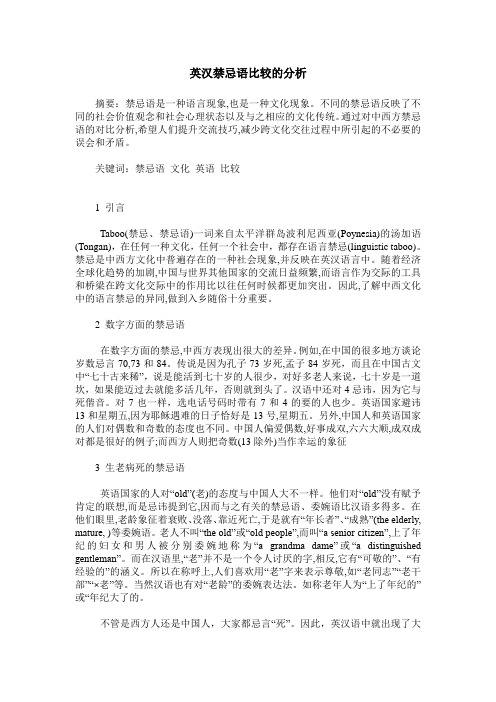
英汉禁忌语比较的分析摘要:禁忌语是一种语言现象,也是一种文化现象。
不同的禁忌语反映了不同的社会价值观念和社会心理状态以及与之相应的文化传统。
通过对中西方禁忌语的对比分析,希望人们提升交流技巧,减少跨文化交往过程中所引起的不必要的误会和矛盾。
关键词:禁忌语文化英语比较1 引言Taboo(禁忌、禁忌语)一词来自太平洋群岛波利尼西亚(Poynesia)的汤加语(Tongan),在任何一种文化,任何一个社会中,都存在语言禁忌(linguistic taboo)。
禁忌是中西方文化中普遍存在的一种社会现象,并反映在英汉语言中。
随着经济全球化趋势的加剧,中国与世界其他国家的交流日益频繁,而语言作为交际的工具和桥梁在跨文化交际中的作用比以往任何时候都更加突出。
因此,了解中西文化中的语言禁忌的异同,做到入乡随俗十分重要。
2 数字方面的禁忌语在数字方面的禁忌,中西方表现出很大的差异。
例如,在中国的很多地方谈论岁数忌言70,73和84。
传说是因为孔子73岁死,孟子84岁死,而且在中国古文中“七十古来稀”,说是能活到七十岁的人很少,对好多老人来说,七十岁是一道坎,如果能迈过去就能多活几年,否则就到头了。
汉语中还对4忌讳,因为它与死偕音。
对7也一样,选电话号码时带有7和4的要的人也少。
英语国家避讳13和星期五,因为耶稣遇难的日子恰好是13号,星期五。
另外,中国人和英语国家的人们对偶数和奇数的态度也不同。
中国人偏爱偶数,好事成双,六六大顺,成双成对都是很好的例子;而西方人则把奇数(13除外)当作幸运的象征3 生老病死的禁忌语英语国家的人对“old”(老)的态度与中国人大不一样。
他们对“old”没有赋予肯定的联想,而是忌讳提到它,因而与之有关的禁忌语、委婉语比汉语多得多。
在他们眼里,老龄象征着衰败、没落、靠近死亡,于是就有“年长者”、“成熟”(the elderly, mature, )等委婉语。
老人不叫“the old”或“old people”,而叫“a senior citizen”,上了年纪的妇女和男人被分别委婉地称为“a grandma dame”或“a distinguished gentleman”。
英汉禁忌语对比分析

3、功能
英汉禁忌语均具有维护社会秩序、遵循社会规范的功能。通过使用禁忌语, 人们可以避免谈论令人尴尬或冒犯的话题,从而减少不必要的冲突和摩擦。此外, 禁忌语还可以起到警示和教育的作用,提醒人们在不同场合下应该保持适当的言 谈举止。例如,在汉语中,“妄议中央”是一个较为严重的禁忌语,旨在引导人 们不要随意发表不当言论。同样地,英语中的“鞭打禁锢”等禁忌语也旨在维护 社会道德和秩序。
英汉禁忌语对比分析的应用
1、语言教学
英汉禁忌语的对比分析在语言教学中具有重要意义。教师可以通过介绍英汉 禁忌语的异同点,帮助学生更好地理解两种文化背景下的语言表达和交际方式。 同时,学生也可以通过了解不同文化中的禁忌语,提高自己的跨文化交际意识和 能力。
2、翻译实践
在翻译实践中,英汉禁忌语的对比分析同样具有指导作用。译者需要具备跨 文化意识,了解两种语言中的禁忌语及其背后的文化内涵。只有这样,才能在忠 实原文的基础上,准确地传达原文中的信息。例如,在翻译过程中,遇到关于 “死亡”的禁忌语时,译者需要根据目标语言的文化背景,选择适当的词汇和表 达方式。
英汉禁忌语在修辞手法和篇章结构方面也有其独特之处。英语中的禁忌语多 采用委婉语和替代词,以避免直接提及禁忌话题,如用“pass away”代替 “die”。而汉语中的禁忌语则更多地体现为避讳和省略,如对年长者的称呼中 会避免使用不吉利的字眼。
四、应用实践:跨文化交流的技 巧
在跨文化交流中,了解英汉禁忌语的异同十分重要。在语言交流中,我们应 尊重对方的文化习惯,避免使用冒犯性的言辞。同时,掌握相应的交流技巧,如 采用间接、委婉的语言表达方式,可以有效地避免因文化差异引起的误解和冲突。 在翻译过程中,译者也需充分考虑原文中的禁忌语,确保译文准确、得体。
中英禁忌语比较
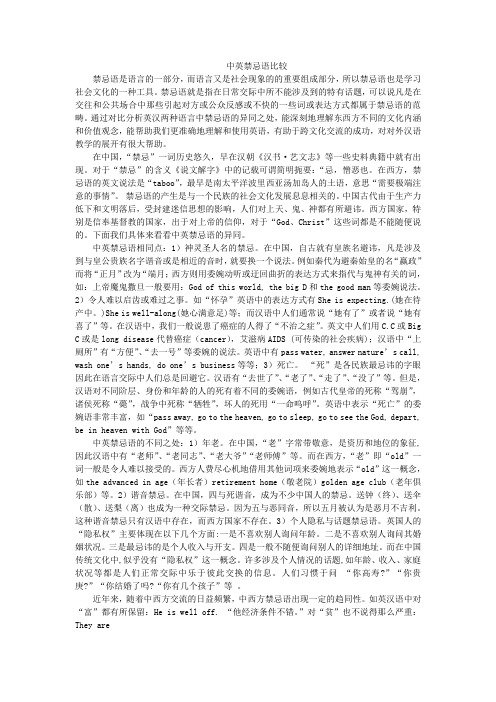
中英禁忌语比较禁忌语是语言的一部分,而语言又是社会现象的的重要组成部分,所以禁忌语也是学习社会文化的一种工具。
禁忌语就是指在日常交际中所不能涉及到的特有话题,可以说凡是在交往和公共场合中那些引起对方或公众反感或不快的一些词或表达方式都属于禁忌语的范畴。
通过对比分析英汉两种语言中禁忌语的异同之处,能深刻地理解东西方不同的文化内涵和价值观念,能帮助我们更准确地理解和使用英语,有助于跨文化交流的成功,对对外汉语教学的展开有很大帮助。
在中国,“禁忌”一词历史悠久,早在汉朝《汉书·艺文志》等一些史料典籍中就有出现。
对于“禁忌”的含义《说文解字》中的记载可谓简明扼要:“忌,憎恶也。
在西方,禁忌语的英文说法是“taboo”,最早是南太平洋波里西亚汤加岛人的土语,意思“需要极端注意的事情”。
禁忌语的产生是与一个民族的社会文化发展息息相关的。
中国古代由于生产力低下和文明落后,受封建迷信思想的影响,人们对上天、鬼、神都有所避讳。
西方国家,特别是信奉基督教的国家,出于对上帝的信仰,对于“God、Christ”这些词都是不能随便说的。
下面我们具体来看看中英禁忌语的异同。
中英禁忌语相同点:1)神灵圣人名的禁忌。
在中国,自古就有皇族名避讳,凡是涉及到与皇公贵族名字谐音或是相近的音时,就要换一个说法。
例如秦代为避秦始皇的名“赢政”而将“正月”改为“端月;西方则用委婉动听或迂回曲折的表达方式来指代与鬼神有关的词,如:上帝魔鬼撒旦一般要用:God of this world, the big D和the good man等委婉说法。
2)令人难以启齿或难过之事。
如“怀孕”英语中的表达方式有She is expecting.(她在待产中。
)She is well-along(她心满意足)等;而汉语中人们通常说“她有了”或者说“她有喜了”等。
在汉语中,我们一般说患了癌症的人得了“不治之症”。
英文中人们用C.C或Big C或是long disease代替癌症(cancer),艾滋病AIDS (可传染的社会疾病);汉语中“上厕所”有“方便”、“去一号”等委婉的说法。
中西文化对比与应用之禁忌语
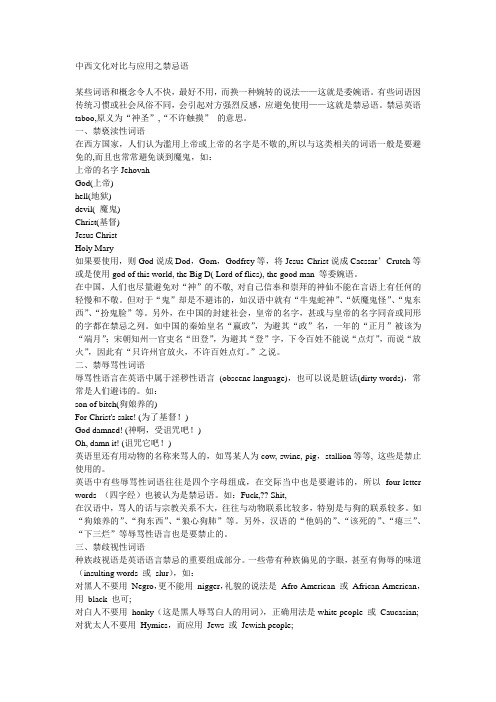
中西文化对比与应用之禁忌语某些词语和概念令人不快,最好不用,而换一种婉转的说法——这就是委婉语。
有些词语因传统习惯或社会风俗不同,会引起对方强烈反感,应避免使用——这就是禁忌语。
禁忌英语taboo,原义为“神圣”,“不许触摸”的意思。
一、禁亵渎性词语在西方国家,人们认为滥用上帝或上帝的名字是不敬的,所以与这类相关的词语一般是要避免的,而且也常常避免谈到魔鬼,如:上帝的名字JehovahGod(上帝)hell(地狱)devil( 魔鬼)Christ(基督)Jesus ChristHoly Mary如果要使用,则God说成Dod,Gom,Godfrey等,将Jesus Christ说成Caessar’Crutch等或是使用god of this world, the Big D( Lord of flies), the good man 等委婉语。
在中国,人们也尽量避免对“神”的不敬, 对自己信奉和崇拜的神仙不能在言语上有任何的轻慢和不敬。
但对于“鬼”却是不避讳的,如汉语中就有“牛鬼蛇神”、“妖魔鬼怪”、“鬼东西”、“扮鬼脸”等。
另外,在中国的封建社会,皇帝的名字,甚或与皇帝的名字同音或同形的字都在禁忌之列。
如中国的秦始皇名“嬴政”,为避其“政”名,一年的“正月”被该为“端月”;宋朝知州一官吏名“田登”,为避其“登”字,下令百姓不能说“点灯”,而说“放火”,因此有“只许州官放火,不许百姓点灯。
”之说。
二、禁辱骂性词语辱骂性语言在英语中属于淫秽性语言(obscene language),也可以说是脏话(dirty words),常常是人们避讳的。
如:son of bitch(狗娘养的)For Christ's sake! (为了基督!)God damned! (神啊,受诅咒吧!)Oh, damn it! (诅咒它吧!)英语里还有用动物的名称来骂人的,如骂某人为cow, swine, pig,stallion等等, 这些是禁止使用的。
中西方禁忌语的差异
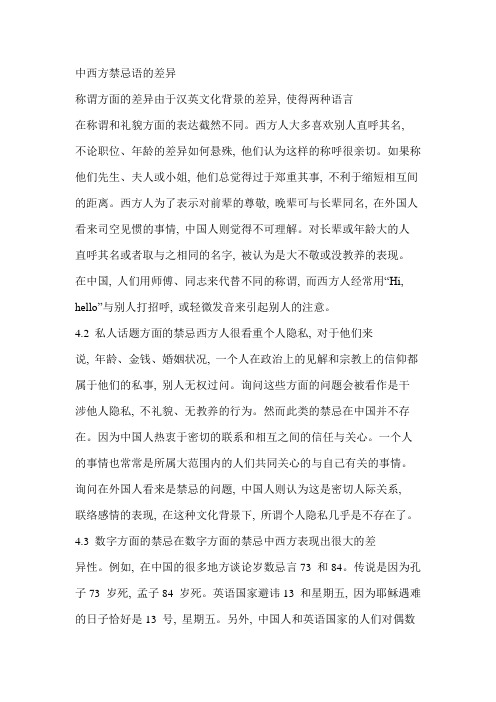
中西方禁忌语的差异称谓方面的差异由于汉英文化背景的差异, 使得两种语言在称谓和礼貌方面的表达截然不同。
西方人大多喜欢别人直呼其名,不论职位、年龄的差异如何悬殊, 他们认为这样的称呼很亲切。
如果称他们先生、夫人或小姐, 他们总觉得过于郑重其事, 不利于缩短相互间的距离。
西方人为了表示对前辈的尊敬, 晚辈可与长辈同名, 在外国人看来司空见惯的事情, 中国人则觉得不可理解。
对长辈或年龄大的人直呼其名或者取与之相同的名字, 被认为是大不敬或没教养的表现。
在中国, 人们用师傅、同志来代替不同的称谓, 而西方人经常用“Hi, hello”与别人打招呼, 或轻微发音来引起别人的注意。
4.2 私人话题方面的禁忌西方人很看重个人隐私, 对于他们来说, 年龄、金钱、婚姻状况, 一个人在政治上的见解和宗教上的信仰都属于他们的私事, 别人无权过问。
询问这些方面的问题会被看作是干涉他人隐私, 不礼貌、无教养的行为。
然而此类的禁忌在中国并不存在。
因为中国人热衷于密切的联系和相互之间的信任与关心。
一个人的事情也常常是所属大范围内的人们共同关心的与自己有关的事情。
询问在外国人看来是禁忌的问题, 中国人则认为这是密切人际关系,联络感情的表现, 在这种文化背景下, 所谓个人隐私几乎是不存在了。
4.3 数字方面的禁忌在数字方面的禁忌中西方表现出很大的差异性。
例如, 在中国的很多地方谈论岁数忌言73 和84。
传说是因为孔子73 岁死, 孟子84 岁死。
英语国家避讳13 和星期五, 因为耶稣遇难的日子恰好是13 号, 星期五。
另外, 中国人和英语国家的人们对偶数和奇数的态度也不同。
中国人偏爱偶数, 好事成双, 六六大顺, 成双成对都是很好的例子; 而西方人则把奇数(13 除外) 当作幸运的象征。
4.4 动物方面的禁忌在中国, 人们认为猫头鹰是倒霉、晦气的象征, 汉语中夜猫子进宅意味着厄运将至, 而在西方, 猫头鹰则被认为是智慧的象征; 中国人对蝙蝠很有好感, 认为蝙蝠是吉祥、健康、幸福的象征, 通常与寿字连在一起出现, 如“五蝠拜寿”。
跨文化交际之中英禁忌语比较
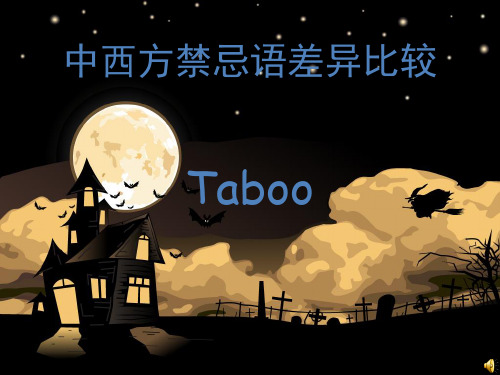
• 尊称 • 尊:尊府、尊兄、尊驾、尊夫人; 贤:贤弟、贤妻; 贵:贵体(有问候意)、贵姓、贵庚; 高:高朋、高见; 大:大礼、大作、大驾。 惠:惠存、惠临、惠顾、惠赠 • 令: 令尊、令堂、令郎、令爱
• 2) 西方受自由平等思想的影响,强调个体 和个人价值,提倡个人的自信和实事求是 的态度,面对赞扬与恭维,大多趋于接受 ,并表示高兴与感谢。
中西方禁忌语差异比较
Taboo
引言
• 在经济和信息日益全球化的今天,不同国家、不 同民族和不同种族人们之间的交流也日益频繁。 不同文化群体的人们在相互接触的过程中,不是 想说什么就说什么,在日常交际中也不是什么话 题都可以涉及,在一定的文化中,参与交际的人 们都会不约而同的对某些话题和某些词汇有意回 避,因为人们不愿或不敢随便谈论这些话题和词 汇,于是语言中就出现了禁忌语。
• 4)五与星期五 • 在中国,“五”是个和谐、优美的数字,表示 “圆满、完全”,特别受人喜爱。如“五湖四海 ”、“五光十色”等。在西方人的观念中,“五 ”没有特别的涵义,却认为“星期五是个不吉祥 的日子,常给人以恐怖之感。一种说法是,星期 五是耶稣受难日,所以主凶,还有人认为,据《 圣经》记载,人类的祖先亚当和夏娃被逐出伊甸 园也是星期五这一天。含有“Friday”的习语也说 明了这一点,如:Black Friday(耶稣受难日,发 生灾难事件的星期五)
• •
3)六与七 在中国,“6”是一个时空谐和数,最为吉祥。俗语“六 六大顺”即是最好的印证。在使用电话号码或汽车车牌号 时,人们尤其钟爱尾数为“66”、“666”、“6666”这几组 数字,因为它们象征着顺顺利利,万事如意。然而由于宗 教的影响,在西方“6”不是一个受欢迎的数字,被视为大 凶数,这从以下习语中也可见。如:at sixes and sevens( 乱七八糟;糊涂的;迷茫的)、hit sb. for six/knock sb. Six (给敌人/某人以毁灭性打击) 、six of the best (以藤 鞭击六———一种惩罚手段)、six penny(不值钱)、six of one and half a dozen of the other (半斤八两,差不多)等 。在西方“666”一直被基督教称为“魔鬼数字”,因为在 《圣经》中,恶魔撒旦的代表符号便是“666”,所以在基 督教中6 代表了浑沌不堪。
浅论中西方禁忌语对比
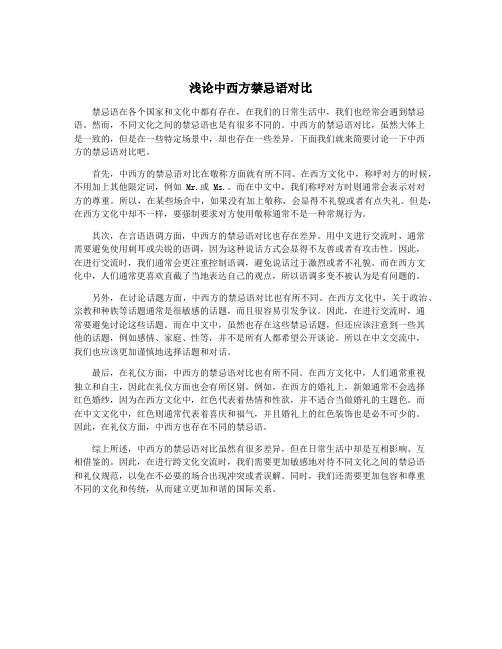
浅论中西方禁忌语对比禁忌语在各个国家和文化中都有存在,在我们的日常生活中,我们也经常会遇到禁忌语。
然而,不同文化之间的禁忌语也是有很多不同的。
中西方的禁忌语对比,虽然大体上是一致的,但是在一些特定场景中,却也存在一些差异。
下面我们就来简要讨论一下中西方的禁忌语对比吧。
首先,中西方的禁忌语对比在敬称方面就有所不同。
在西方文化中,称呼对方的时候,不用加上其他限定词,例如 Mr.或 Ms.。
而在中文中,我们称呼对方时则通常会表示对对方的尊重。
所以,在某些场合中,如果没有加上敬称,会显得不礼貌或者有点失礼。
但是,在西方文化中却不一样,要强制要求对方使用敬称通常不是一种常规行为。
其次,在言语语调方面,中西方的禁忌语对比也存在差异。
用中文进行交流时,通常需要避免使用刺耳或尖锐的语调,因为这种说话方式会显得不友善或者有攻击性。
因此,在进行交流时,我们通常会更注重控制语调,避免说话过于激烈或者不礼貌。
而在西方文化中,人们通常更喜欢直截了当地表达自己的观点,所以语调多变不被认为是有问题的。
另外,在讨论话题方面,中西方的禁忌语对比也有所不同。
在西方文化中,关于政治、宗教和种族等话题通常是很敏感的话题,而且很容易引发争议。
因此,在进行交流时,通常要避免讨论这些话题。
而在中文中,虽然也存在这些禁忌话题,但还应该注意到一些其他的话题,例如感情、家庭、性等,并不是所有人都希望公开谈论。
所以在中文交流中,我们也应该更加谨慎地选择话题和对话。
最后,在礼仪方面,中西方的禁忌语对比也有所不同。
在西方文化中,人们通常重视独立和自主,因此在礼仪方面也会有所区别。
例如,在西方的婚礼上,新娘通常不会选择红色婚纱,因为在西方文化中,红色代表着热情和性欲,并不适合当做婚礼的主题色。
而在中文文化中,红色则通常代表着喜庆和福气,并且婚礼上的红色装饰也是必不可少的。
因此,在礼仪方面,中西方也存在不同的禁忌语。
综上所述,中西方的禁忌语对比虽然有很多差异,但在日常生活中却是互相影响、互相借鉴的。
汉英禁忌语的语用对比
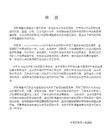
汉英禁忌语的语用对比(1)(3)
发布时间:2010-11-20 来源:应届毕业生求职网
(三)﹑禁用关于病和死方面的词语
“生﹑老﹑病﹑死”是人之常情,是一个自然规律。但是人们对于生老病死的恐惧,导致了人们对这一话题的禁忌。中西方都有这些禁忌,不愿或者不敢提及这类词,主要是一种心理因素,因为人们都感到恐惧。比如人们忌说癌症,说话人一方面担心自己会染上这种病,另一方面也顾及到听者的感受,所以英语一般用“the big C” “long illness”来避免使用“cancer”这个词。英语中就用“go to heaven ;be gone to a better world; to go to another world ; troubles be over now ;to depart ;to be gone ;to pay one’s dabt to nature ; to breathe one’s last ,等等。而死在汉语中也是更加避讳的。人们害怕死亡,很不愿意提到死亡有关的名物。现代汉语口语就有“过去了”﹑“不在了”﹑“去世了”﹑“离开了”等说法。但是,汉语对不同阶层,身份,和年龄的人的死有着不同的委婉语说。在古代皇帝死了,一般称为驾崩,年轻人死就叫做夭折,战争中死的称为光荣牺牲坏人的死用断气等。死对于人们来说是一种不愉快的事情,当代共产党人干革命。搞建设,依靠的是马克思的理论,追求的是共产主义的思想。一些革命者把死说成是见马克思去或向马克思报到。这一比喻表达了共产党人忠于理想、视死如归的高尚情操。由于,人们都希望自己能够健康长寿,害怕死亡,所以在实际的交际中,尽量避免使用这些有关病死的词语。寄托了一种良好的愿望以及怀着对死者不舍的特殊感情。
(一)﹑禁用亵渎性词语
在西方国家,有些基督教徒,对上帝非常的虔诚,他们认为滥用上帝或上帝的名字是不敬的,所以与这类相关的词语一般是要避免的.宗教和宗教信仰是禁忌语存在的一个重要领域。在信仰基督教的西方,上帝的名字Jehovah便是最大的禁忌语。在任何情况下,人们都不说,不滥用上帝的名字。据说上帝在西奈山通过摩西与以色列人订立盟约,规定了以色列人必须遵守的十戒(the ten commandments),其中第三戒为“Thou shalt not speak my nanme in vain”(尔等不可妄用我的名字),所以有的人往往避而不用God(上帝)﹑ hell(地狱) ﹑devil( 魔鬼)、Christ(基督)、damn(该死)等词语,而代之以 gosh, golly﹑for goodness sake or for crying out loud (看在上帝的份上)等;不用Jesus一词,而用Gee, Jeepers, Jiminy 等。就像中国人一样,要尽量避免对“神”的不敬,并且,人们还经常避免提到魔鬼的名字。这在西方国家也是同样存在着禁忌的。这通常是因为人们的畏惧心理,怕它给自己带来噩运。于是用the deuce, the dickens, Old Nick等语来代替the Devil一语。不论是原始人,还是现代人,对神和鬼都有一种敬畏之心。中国人的宗教信仰很多,与宗教相关的禁忌语是很多的。首先中国忌亵渎神灵,对自己信奉和崇拜的神仙不能在言语上有任何的轻慢和不敬。在中国信仰佛教和道教的人都是忌妄言。所谓“妄言”就是胡说、乱说、说假话。中国人受孔子思想影响较深。孔孟之道崇尚礼仪,要求人们在社交活动中言语适度,不可妄言或者信口开河,不着边际。中国人主要是汉族,为了保护一家老少生活幸福平安,还信仰家庭门神。“门神”, “财神”, “水神”等,他们能保佑一家人生活平安喜乐。因此人们买来贴于门户或供于堂中。但“买”字是很忌讳的,于是换成“请”,以免亵渎神灵。在中国也有敬动物为神的习俗,这在一些评剧中得到了体现,在当时戏班子的人忌说五种动物的名字,它们分别是老鼠、刺猬、黄鼠狼、狐狸、蛇。如果有谁不慎说了这些动物的名字,就要受到处分,有时还是很严重的处分。他们分别称这五种动物为“灰八爷”、“白五爷”、“黄大爷”、“大仙爷”、“柳七爷”。在东北长白山一带,自古有“祠虎以为神”的习俗。当地的老百姓认为虎是林中之王,能保护人们免受其他野兽之害,给人们带来幸福。所以当地山民忌说虎名而把它称之为“山君”、或“山神爷”。因此,中西文化中,对神的崇拜使人们对上帝、鬼神等宗教信仰融入了日常生活,宗教上禁用亵渎性词语成为一种共识,在中西文化中,人们言语上都尽量避免使用这些带有亵渎神灵的词语。
中英人之间的语言禁忌差异
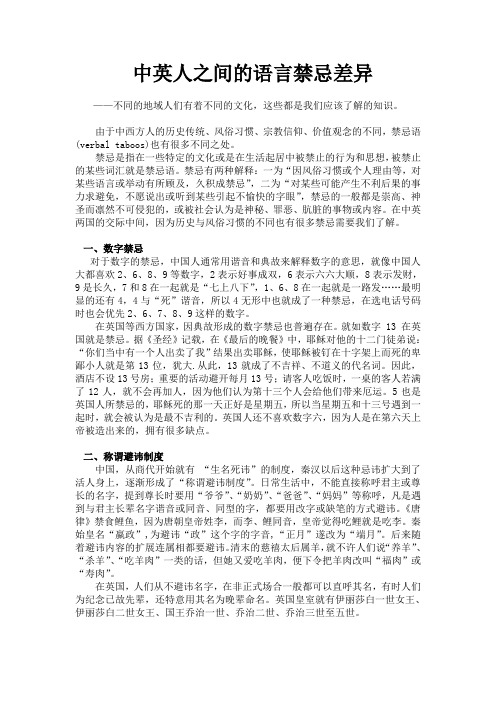
中英人之间的语言禁忌差异——不同的地域人们有着不同的文化,这些都是我们应该了解的知识。
由于中西方人的历史传统、风俗习惯、宗教信仰、价值观念的不同,禁忌语(verbal taboos)也有很多不同之处。
禁忌是指在一些特定的文化或是在生活起居中被禁止的行为和思想,被禁止的某些词汇就是禁忌语。
禁忌有两种解释:一为“因风俗习惯或个人理由等,对某些语言或举动有所顾及,久积成禁忌”,二为“对某些可能产生不利后果的事力求避免,不愿说出或听到某些引起不愉快的字眼”,禁忌的一般都是崇高、神圣而凛然不可侵犯的,或被社会认为是神秘、罪恶、肮脏的事物或内容。
在中英两国的交际中间,因为历史与风俗习惯的不同也有很多禁忌需要我们了解。
一、数字禁忌对于数字的禁忌,中国人通常用谐音和典故来解释数字的意思,就像中国人大都喜欢2、6、8、9等数字,2表示好事成双,6表示六六大顺,8表示发财,9是长久,7和8在一起就是“七上八下”,1、6、8在一起就是一路发……最明显的还有4,4与“死”谐音,所以4无形中也就成了一种禁忌,在选电话号码时也会优先2、6、7、8、9这样的数字。
在英国等西方国家,因典故形成的数字禁忌也普遍存在。
就如数字 13 在英国就是禁忌。
据《圣经》记载,在《最后的晚餐》中,耶稣对他的十二门徒弟说:“你们当中有一个人出卖了我”结果出卖耶稣,使耶稣被钉在十字架上而死的卑鄙小人就是第13位,犹大.从此,13就成了不吉祥、不道义的代名词。
因此,酒店不设13号房;重要的活动避开每月13号;请客人吃饭时,一桌的客人若满了12人,就不会再加人,因为他们认为第十三个人会给他们带来厄运。
5也是英国人所禁忌的,耶稣死的那一天正好是星期五,所以当星期五和十三号遇到一起时,就会被认为是最不吉利的。
英国人还不喜欢数字六,因为人是在第六天上帝被造出来的,拥有很多缺点。
二、称谓避讳制度中国,从商代开始就有“生名死讳”的制度,秦汉以后这种忌讳扩大到了活人身上,逐渐形成了“称谓避讳制度”。
从中英语言禁忌看中西方文化的差异(一)【推荐下载】
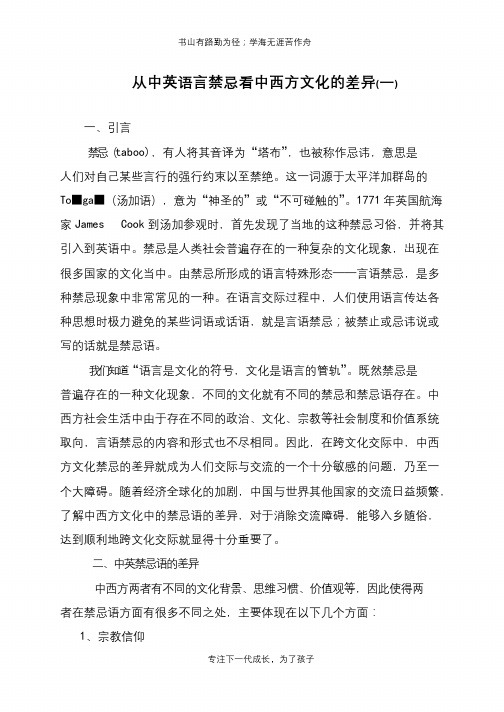
书山有路勤为径;学海无涯苦作舟
从中英语言禁忌看中西方文化的差异(一)
一、引言
禁忌(taboo),有人将其音译为“塔布”,也被称作忌讳,意思是
人们对自己某些言行的强行约束以至禁绝。
这一词源于太平洋加群岛的
To■ga■(汤加语),意为“神圣的”或“不可碰触的”。
1771年英国航海
家James Cook到汤加参观时,首先发现了当地的这种禁忌习俗,并将其引入到英语中。
禁忌是人类社会普遍存在的一种复杂的文化现象,出现在很多国家的文化当中。
由禁忌所形成的语言特殊形态——言语禁忌,是多种禁忌现象中非常常见的一种。
在语言交际过程中,人们使用语言传达各种思想时极力避免的某些词语或话语,就是言语禁忌;被禁止或忌讳说或写的话就是禁忌语。
我们知道“语言是文化的符号,文化是语言的管轨”。
既然禁忌是
普遍存在的一种文化现象,不同的文化就有不同的禁忌和禁忌语存在。
中西方社会生活中由于存在不同的政治、文化、宗教等社会制度和价值系统取向,言语禁忌的内容和形式也不尽相同。
因此,在跨文化交际中,中西方文化禁忌的差异就成为人们交际与交流的一个十分敏感的问题,乃至一个大障碍。
随着经济全球化的加剧,中国与世界其他国家的交流日益频繁,了解中西方文化中的禁忌语的差异,对于消除交流障碍,能够入乡随俗,达到顺利地跨文化交际就显得十分重要了。
二、中英禁忌语的差异
中西方两者有不同的文化背景、思维习惯、价值观等,因此使得两
者在禁忌语方面有很多不同之处,主要体现在以下几个方面:
1、宗教信仰
专注下一代成长,为了孩子。
浅论中西方禁忌语对比
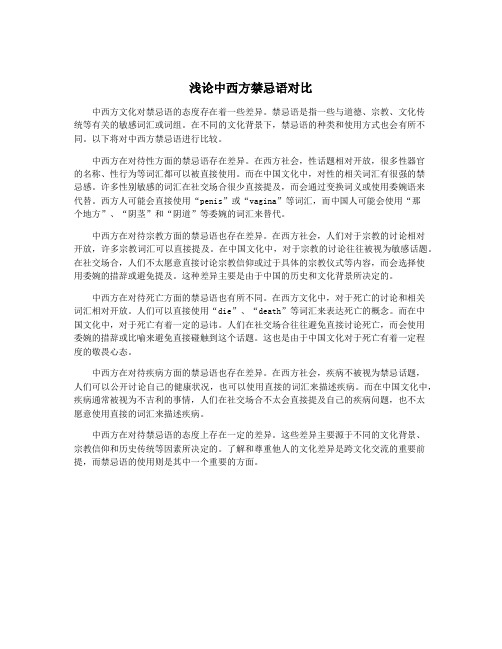
浅论中西方禁忌语对比中西方文化对禁忌语的态度存在着一些差异。
禁忌语是指一些与道德、宗教、文化传统等有关的敏感词汇或词组。
在不同的文化背景下,禁忌语的种类和使用方式也会有所不同。
以下将对中西方禁忌语进行比较。
中西方在对待性方面的禁忌语存在差异。
在西方社会,性话题相对开放,很多性器官的名称、性行为等词汇都可以被直接使用。
而在中国文化中,对性的相关词汇有很强的禁忌感。
许多性别敏感的词汇在社交场合很少直接提及,而会通过变换词义或使用委婉语来代替。
西方人可能会直接使用“penis”或“vagina”等词汇,而中国人可能会使用“那个地方”、“阴茎”和“阴道”等委婉的词汇来替代。
中西方在对待宗教方面的禁忌语也存在差异。
在西方社会,人们对于宗教的讨论相对开放,许多宗教词汇可以直接提及。
在中国文化中,对于宗教的讨论往往被视为敏感话题。
在社交场合,人们不太愿意直接讨论宗教信仰或过于具体的宗教仪式等内容,而会选择使用委婉的措辞或避免提及。
这种差异主要是由于中国的历史和文化背景所决定的。
中西方在对待死亡方面的禁忌语也有所不同。
在西方文化中,对于死亡的讨论和相关词汇相对开放。
人们可以直接使用“die”、“death”等词汇来表达死亡的概念。
而在中国文化中,对于死亡有着一定的忌讳。
人们在社交场合往往避免直接讨论死亡,而会使用委婉的措辞或比喻来避免直接碰触到这个话题。
这也是由于中国文化对于死亡有着一定程度的敬畏心态。
中西方在对待疾病方面的禁忌语也存在差异。
在西方社会,疾病不被视为禁忌话题,人们可以公开讨论自己的健康状况,也可以使用直接的词汇来描述疾病。
而在中国文化中,疾病通常被视为不吉利的事情,人们在社交场合不太会直接提及自己的疾病问题,也不太愿意使用直接的词汇来描述疾病。
中西方在对待禁忌语的态度上存在一定的差异。
这些差异主要源于不同的文化背景、宗教信仰和历史传统等因素所决定的。
了解和尊重他人的文化差异是跨文化交流的重要前提,而禁忌语的使用则是其中一个重要的方面。
中英禁忌语差异开题报告
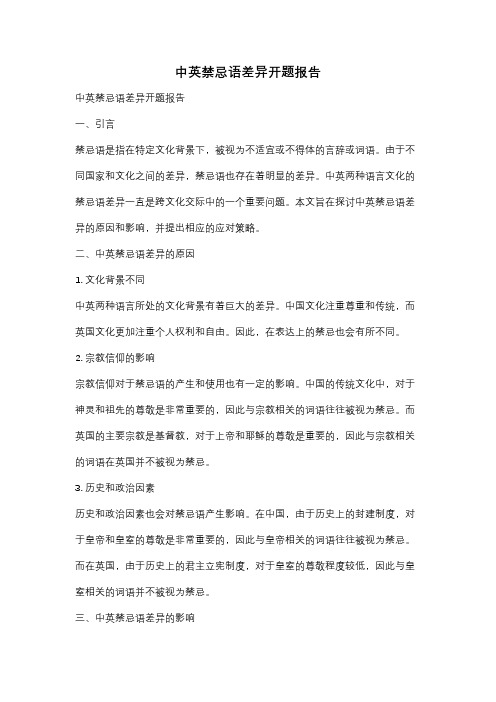
中英禁忌语差异开题报告中英禁忌语差异开题报告一、引言禁忌语是指在特定文化背景下,被视为不适宜或不得体的言辞或词语。
由于不同国家和文化之间的差异,禁忌语也存在着明显的差异。
中英两种语言文化的禁忌语差异一直是跨文化交际中的一个重要问题。
本文旨在探讨中英禁忌语差异的原因和影响,并提出相应的应对策略。
二、中英禁忌语差异的原因1. 文化背景不同中英两种语言所处的文化背景有着巨大的差异。
中国文化注重尊重和传统,而英国文化更加注重个人权利和自由。
因此,在表达上的禁忌也会有所不同。
2. 宗教信仰的影响宗教信仰对于禁忌语的产生和使用也有一定的影响。
中国的传统文化中,对于神灵和祖先的尊敬是非常重要的,因此与宗教相关的词语往往被视为禁忌。
而英国的主要宗教是基督教,对于上帝和耶稣的尊敬是重要的,因此与宗教相关的词语在英国并不被视为禁忌。
3. 历史和政治因素历史和政治因素也会对禁忌语产生影响。
在中国,由于历史上的封建制度,对于皇帝和皇室的尊敬是非常重要的,因此与皇帝相关的词语往往被视为禁忌。
而在英国,由于历史上的君主立宪制度,对于皇室的尊敬程度较低,因此与皇室相关的词语并不被视为禁忌。
三、中英禁忌语差异的影响1. 跨文化交际的困难中英禁忌语差异给跨文化交际带来了困难。
在交流中,若不了解对方国家的禁忌语,很容易触碰到对方的敏感点,导致误解甚至冲突的发生。
2. 影响社交和商务活动禁忌语的使用不当可能会影响社交和商务活动的进行。
在国际商务谈判中,若使用了对方国家的禁忌语,可能会导致谈判破裂或者对方的不满,从而影响合作关系。
3. 文化认同感的影响禁忌语的使用也与文化认同感密切相关。
若在跨文化交际中不了解对方国家的禁忌语,并且频繁触碰到对方的禁忌,可能会导致对方对自己的文化产生负面的认知和评价,从而影响文化认同感的建立。
四、应对策略1. 学习和了解对方国家的禁忌语在跨文化交际中,了解对方国家的禁忌语是非常重要的。
可以通过学习相关的文化知识、交流和咨询当地人等方式,积极了解对方国家的禁忌语,以避免因为不慎触碰到禁忌而导致的误解和冲突。
中西英汉禁忌语的比较
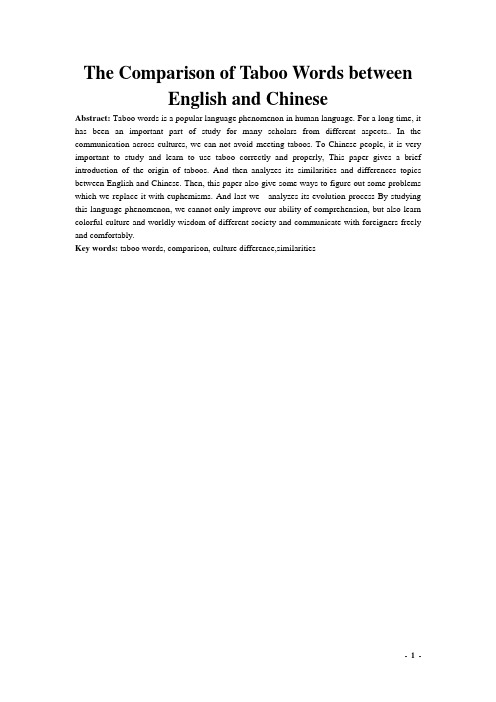
The Comparison of Taboo Words betweenEnglish and ChineseAbstract: Taboo words is a popular language phenomenon in human language. For a long time, it has been an important part of study for many scholars from different aspects.. In the communication across cultures, we can not avoid meeting taboos. To Chinese people, it is very important to study and learn to use taboo correctly and properly, This paper gives a brief introduction of the origin of taboos. And then analyzes its similarities and differences topics between English and Chinese. Then, this paper also give some ways to figure out some problems which we replace it with euphemisms. And last we analyzes its evolution process By studying this language phenomenon, we cannot only improve our ability of comprehension, but also learn colorful culture and worldly wisdom of different society and communicate with foreigners freely and comfortably.Key words: taboo words, comparison, culture difference,similaritiesIntroductionLinguistic taboo is the common social phenomenon in different nationalities. Culture is the reflection of language which is the carrier of culture. Though language is arbitary, but it has its own inexlicable magic power as language is the tool of communication about thoughts and emotions. With the development of Two-way communication by ferquently using Chinese and English, taboo worids is becoming one of the most important parts among international communications. Therefore, the discussion of the relation between the taboo and language is conducive to English teaching and communication. What’s more, it can also help us to have a better understanding of attitudes and thinking models between China and Britain.1.The origin and background of tabooThe word “Taboo” can be traced back to the language of Tonga , Polynesian. It means “the things extremely should be paid attention”. “Taboo” also means holy, untouchable and was forbiddon used at that time. It has two aspects about this phenomenon. One is that the respected sacred items can not be literally used and the other one is people cann’t touch the nidering things casually. The production of taboo word has its own age reasons. When it was ancient ages, people had blind faith in ghosts and gods and worship God. Those things linked with ghosts and gods would not be talked casually as it might bring unfortunate to them. So it is the original reason about the taboo word. At the same time, except the region element, with the development of our society and the globalization of the whole world on custom, culture tradition, self-cultivation and communication also have a great impact on the appearance of taboo word. In different cultures, the contents and forms of taboo are different. Generally speaking, here are six types of it: mention of gods, near- swearing, sex, death, disease and excretion. However, this kind classification is not absolutely literally because the taboo is the reflection of different countries, races and cultures. What we should do is to know about them then have a good communication with others.2. The similarities between English and Chinese tabooWe all know that, we can distinguish the differences from different customs and history from both two languages, but no matter how unlike they are, there must have some similarities as we need learn and study and carry it out, especially in international communications. Both of us have taken the analogous methods to avoid those taboo[1]. And the best way to solve it is to have a suitable use of euphemism. Followed are the main aspects belong to taboos in Britain and China: 2.1 Taboos on disease and deathDisease and death is the regular pattern and it is the common topic and can not be avoided to people. There are many reasons why they are unwilling to mention it, maybe they are afraid of it and think it will bring unlucky to them. But the most important one would be the burden of their psychology. In English, people use many other euphemisms to express disease or death. Such as “be safe in the arms of Jesus”, “be asleep in the valley”,“be in Abraham’s bosom”, “be promoted to glory”,“be taken to paradise”,“breathe one's last”etc. In China, people also evade the word “death”, they may often say “mount and ride away to Elysian” or “Pass away peacefully.” From the ancie nt ages to now, there are various ways to call the different classic people’s death. For example, in English people say “He fell in battle”instead of “He was killed”. While we Chinese will say “He devoted himself to the country”. At the same time, when we talked about someonewas ill or got serious diseases, we also have tactful address. For instance, we will say “Are you feeling OK? ” to replace“Are you ill? ”. And we will use “C.C” to take the place of canner. Venereal disease substitute for “V.D”.2.2 Taboos on religion and addressThe earliest taboo of Britain is related to religion and the words about gods are regarded as holy. So people could not be blasphemous to them. They started to use euphemism to convey their respect to the gods. [2]Such as: men call the God and Satan as“the god of the world”, “the Big D”, “the good man”, “Dadi(大帝)” , “Dashen(大神)” instead of words with evil meaning. And at the same time, to China especially in the feudalism society, the common people should avert using the same words as the rulers names because the ruler should stay his unique position and nobody can shake his power. As we know, in Qin ages, the emperor named Ying Zheng. In order to not offend his imperial power, people changed “正月”into“端月”or read the word “正”in the first tone as “征”. It was very common in our ancient ages, liked the “Wen Zi Yu” in Qin dynasty as it was a big event on writings.2.3 Taboos on sexThis topic still be a secret and private one to human beings from the ancient times to now. Most of the people think it is impolite to mention anything about sex in some the social or formal interactions. Those words related with sex or genitals can be only used on a very informal occasion or in the field of medical. One of the most important reason is that both of the countries’s people, they will be very care of the education to their children. Due to the Sex Liberation in the western countries during the 1960s, the English speaking countries took a more freedom, open attitude towards sex. therefore, the phrases “to make love”, “to have sex with” “art of pleasure”, “to approach” could be often found in written form, however, when they talk about something on it, people tend to replace them with the euphemisms[2]. And when we talked about somebody has baby, people would lke to say “in the family way” or “in a delicate condition” rather than use the wold “pregnant”. And to Chinese, in general, we may say “she will be a mother soon” or “she has something happy”.2.4 Taboos on sexual discriminationIn both English and Chinese, there are lots of languages whose centre is depended on man. They are partial to and side with man while belittle woman. The most obvious example is that people will not use “she”to instead of “he” in communication as well as t o Chinese when the sexual distinction is not clear. The host will call woman “chairman” even “madam chairman”. In ancient China, women are thought as ignorance, lower status, “woman’s view(妇人之见)”,“long hair with short experience(头发长见识短)” and so on. While the husband may call his wife as “in home(家里的)”,“the behind(后头的)”or “humble wife(贱内)”. As for Chinese characters, there are lot of words with evil meaning formed by “女”,such as “奸”,“嫖”,and “婊”. So it is unfair for people to look down on woman.In conclusion, the taboo in English and Chinese have some similar characters and tendency. Though there may be lots of differences on geography , languages, customs and other aspects, the thought of one thing can't be totally contrary, it is the general character of human.3. The differences between English and Chinese tabooEnglish and Chinese are belong to two different language families, included the discrepancieson history, culture, thought, cognition, psychology and other terms, which have made the inevitable differences between English and Chinese taboo. We can see it fall into the following four aspects.3.1 Taboos on age and body weightIn English communication, the question “How old are you?” and “What is your age?”are seldom used by people as it is very impolite and embarrassed to ask such questions. They would like to say “senior citizen” than “old people” and when say someone is fat, we can describe he/she as full figure. “Becoming old” is an inexorable natural law, however, people in China and Britain hold different opinion towards it, and produce different cultural connotations. Generally speaking, Chinese give “the old age” a more positive meaning, for “old” is the symbol of wisdom and experience. Chinese people always take the old age to proud when they are addressed as “old Wang”, “old Yang”, or “old Zhou”. As the saying goes“老骥伏枥,志在千里”and “姜还是老的辣”. And to weight, most Chinese people are found of “a little bit heavier(发福)”,as it indicates that he/she has a good life condition. Particularly in Tang dynasty people see fat as beauty.3.2 Taboos on income and matrimonyThese two aspects are both private things. People take serious attitude toward it in English speaking countries. While in China, the daily conversation like “Are you married?”, “What is you income?”, “How much is you cloth?” or “Why do you divorce with your husband?”is easily accepted by Chinese as people think it is a good reflection about their works and lives and they are all pleasant to share them with others. To English, it will be regarded as one kind invasion of privacy and people will be unhappy if you ask such questions. Unlike Chinese, English people will often greet other people with the question “How nice the weather!” , “Morning!” or “How are you!”. Because Chinese think i t is a good way to further affection between friends or neighbours by talking about the most care thing and also can show solicitude for others. To youth, nowadays, most people will judge if he/she is a close friend depend on whether he/she talk everything with him/her. It maybe a little absolute but it is the common phenomenon in China.3.3 Taboos on politicsWith the rapidly development of frequent international associations, under the globalization, there have been turned up some political euphemism, s uch as “developing countries”and “south-north dialogue(south represents developing countries and north represents developed countries )”. It is very important for those countries to pay attention to the political taboos because it can have a great impact o n the whole world’s common development and harmony, like economy, military affairs, culture, etc. so that they can achieve the rewarding benefits. In the international communication, the peace of the world is very important. A suitable address of conference or activities should avoid discriminating undeveloped countries so that can make the communication smoothly.ConclusionIn a word, every country or nationality has its own taboos as we are living in different environment, which determine we could not have the same things on common. What we should do is to know about the differences and similarities of taboo words between English and Chinese thenwe can have a full use of them to create a more harmonious atmosphere for international communication and cooperation. After that, when we come cross some taboos about the place, we can have a quick response to adopt euphemism or other ways to replace it. That is the target why we do such studies. No matter we talk about the differences or similarities, based on nowadays achievements, we can clearly see that some aspects of the taboos are becoming the same though they are almost different now. At the same time, the mix together of different cultures also remind us to keep the characters of native culture and improve it by learning others, which will be a appropriate method to enhance the international communication.References[1].Zhen ya. Language and Culture [M]. Beijing: Higher Education Press, 2004[2]Chang Yujie. On Cultural Difference of the Taboo Words between English and Chinese,2011[3]胡文仲.中西文化习俗比较.北京: 外语教学与研究出版社, 2001.[4]李桂媛. 英汉禁忌语及委婉语探讨[ J ]. 天津外国语学院学报, 2004, (5)[5]叶玲. 浅谈带有社会和心理印记的英汉禁忌语[J]. 科技资讯,2007(14).。
浅论中西方禁忌语对比
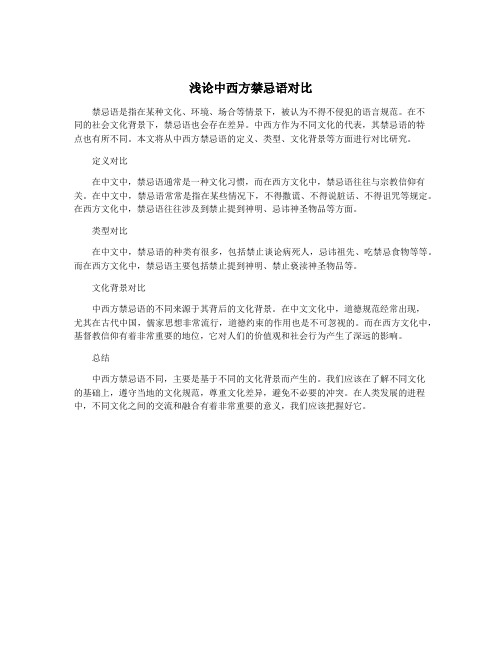
浅论中西方禁忌语对比
禁忌语是指在某种文化、环境、场合等情景下,被认为不得不侵犯的语言规范。
在不
同的社会文化背景下,禁忌语也会存在差异。
中西方作为不同文化的代表,其禁忌语的特
点也有所不同。
本文将从中西方禁忌语的定义、类型、文化背景等方面进行对比研究。
定义对比
在中文中,禁忌语通常是一种文化习惯,而在西方文化中,禁忌语往往与宗教信仰有关。
在中文中,禁忌语常常是指在某些情况下,不得撒谎、不得说脏话、不得诅咒等规定。
在西方文化中,禁忌语往往涉及到禁止提到神明、忌讳神圣物品等方面。
类型对比
在中文中,禁忌语的种类有很多,包括禁止谈论病死人,忌讳祖先、吃禁忌食物等等。
而在西方文化中,禁忌语主要包括禁止提到神明、禁止亵渎神圣物品等。
文化背景对比
中西方禁忌语的不同来源于其背后的文化背景。
在中文文化中,道德规范经常出现,
尤其在古代中国,儒家思想非常流行,道德约束的作用也是不可忽视的。
而在西方文化中,基督教信仰有着非常重要的地位,它对人们的价值观和社会行为产生了深远的影响。
总结
中西方禁忌语不同,主要是基于不同的文化背景而产生的。
我们应该在了解不同文化
的基础上,遵守当地的文化规范,尊重文化差异,避免不必要的冲突。
在人类发展的进程中,不同文化之间的交流和融合有着非常重要的意义,我们应该把握好它。
禁忌语

在中国, “禁忌”一词的历史也很悠久。早在 汉朝就已经在一些史料典籍中出现。
《汉书〃艺文志》中记载: “及拘者为之, 则牵 于禁忌, 泥于小数, 舍人事而任鬼神。” 中国是一个以差序格局为文化取向的社会, 历来 讲究“君君、臣臣、父父、子子”。可见, 禁忌 作为一种文化现象在中国应该在汉朝之前就已产生。
人们对死亡的恐惧还延续到对疾病的忌讳:
我病了 英语:I’m ill, I’m not feeling well 汉语:我不太舒服 癌症:the big C, 那个病 忌讳数字:13 , 4
4、贬义性的禁忌语
美国种族歧视(白人种族主义者)
黑人:Nigger, Negro
华人:Chinks
波兰人:polacks
2、猥亵性的禁忌语
因人类有共同的荣辱观和羞耻感,人们用 语都力求避俗就雅,英汉文化都把猥亵性词 语当作是不雅而需要回避的词语。这类词被 认为是粗俗而不堪入耳的,它们主要涉及人 体某些部位、性行为以及分泌排泄等不洁之 物,在交际中一般要用委婉的、含蓄的或雅 致的词语来代替。
• 在英汉两种语言中,都忌讳直接提到人体 某些器官和性行为等。然而,所谓“具有 四个字母的词语”(four-letter words)如 fuck,tits等,在大多数谈话中仍被认为是不 得体的,尤其是在男女都有的场合,就更 显得不礼貌了。
汉语中也有歧视妇女现象。比如“妇人之见”、 “男子汉不同妇人一般见识”之类的话就反映了人 们瞧不起妇女的态度。丈夫把妻子叫做“家里的”、 “内人”等,表明妻子无非是在家里干点家务活儿 的人而已。此外,妻子的命运和社会地位完全取决 于丈夫。俗话说:“夫唱妇随”,就反映了这种依 附关系。
汉字的写法有明显的歧视妇女现象。许多汉语贬 义章都有“女”字偏旁(或部首),数目多得惊 人.这里只举几个例子,如:奸、婪、嫉、媚等。 连指女性的“阴”字也常用来构成贬义词。如;阴 毒、阴森、阴谋等。
浅论中西方禁忌语对比

浅论中西方禁忌语对比中西方禁忌语是两种不同文化背景下的反映,每个文化都有自己的特点和价值观念,因此在表达中会有一些禁忌语涉及到的内容也会不同。
本文就中西方禁忌语进行对比,分析其差异和原因。
一、言辞直率与严肃性的差异在中西方文化中,禁忌语的差异主要表现在言辞直率程度和严肃性上。
在西方社会中,人们更加倾向于直接表达自己的思想和情感,因此禁忌语的使用相对来说会更加自由和宽松。
在西方国家中,人们在日常交流中经常使用一些带有性暗示或粗俗语言的表达方式,而这在中国文化中是禁忌的。
这主要是因为中西方文化中的性观念和道德观念有所不同,西方社会更加开放和进步,对性的认知和接受程度较高,因此涉及到性话题的禁忌语也相对较少。
在严肃性方面,西方社会更加倾向于幽默和调侃,对于一些严肃话题也会采用一些幽默和调侃的方式进行表达。
西方人在开会或讨论一些敏感话题时可能会用一些讽刺和讥讽的语言,来缓解紧张的氛围。
而在中国文化中,人们通常更加注重尊重和庄重,对于一些严肃话题会采用更加谨慎和谦虚的方式进行表达,禁忌语的使用相对会较为严格。
二、尊重和礼貌的不同观念三、宗教信仰对禁忌语的影响宗教信仰也是中西方禁忌语差异的一个重要因素。
在西方社会中,基督教是主要宗教之一,而基督教中强调的爱、宽容和谦逊等价值观念对西方人的行为方式有深远影响。
西方社会中对于一些与宗教相关的话题,如神灵、圣经等的讨论通常会更加谨慎和尊重。
与此相反,中国文化中的传统宗教是佛教和道教,这两者对于禁忌语的定义并没有那么明确,因此在中西方禁忌语中对于宗教话题的限制也会有所不同。
中西方禁忌语的差异主要体现在言辞直率程度、严肃性、尊重和礼貌观念以及宗教信仰等方面。
这些差异源于中西方文化的不同背景和价值观念,每种文化都有其独特的特点和禁忌。
在跨文化交流中,了解和尊重对方的文化差异是十分重要的,避免因为禁忌语的使用而引发不必要的误会和冲突。
浅论中西方禁忌语对比

浅论中西方禁忌语对比中西方禁忌语是由不同文化传统和社会价值观念所塑造的,反映了不同文化间对某些话题的敏感度和对个人尊严、社会和谐的追求。
尽管中西方禁忌语在形式和内容上存在一定差异,但它们都有着深刻的文化背景和社会意义。
本文将从几个方面对中西方禁忌语进行对比分析。
中西方禁忌语在性话题上存在明显的差异。
在中国文化中,性是一个较为敏感的话题,通常被视为隐私的一部分。
中国人往往避免在公共场合或与陌生人之间谈论性话题,甚至连简单的性别暗示也会被视为不文雅。
相比之下,西方社会在性话题上较为开放和宽容。
在许多西方国家,人们可以在公共场合自由地谈论性相关的话题,甚至在电视、电影中表现出较为直接的性暗示和描写。
在宗教与政治话题上,中西方禁忌语也存在差异。
中国是一个多民族、多宗教的国家,尽管宗教信仰自由,但对于在公共场合谈论宗教话题存在一定限制。
在中国社会,以及许多东方社会中,政治话题也常常被视为敏感的禁忌,公众对于谈论政治会存在一定的担忧。
而在西方社会,宗教和政治话题相对较为开放,人们可以自由地进行讨论和表达政治观点,这体现了西方社会对言论自由的重视和宪法保障。
中西方社交礼仪也存在一些不同,涉及到禁忌语的使用。
在中国文化中,尊重他人、维护面子和形象是非常重要的。
在中文社交场合中,人们往往避免使用直接的批评或否定性的语言。
相对而言,西方社交中更注重直接和坦率的沟通,人们更倾向于直接表达自己的意见和对他人的评价。
这种直接和坦率的表达方式在中国文化中可能被视为失礼和冒犯。
中西方禁忌语在对待敏感话题时也有不同的观念。
在中国文化中,尊重长辈和上级的权威地位是非常重要的。
在与年长者或上级交流时,中国人通常会使用更加委婉的措辞,避免直接质问或批评。
相比之下,西方社会更强调平等和个人权利,人们更倾向于直接表达自己的意见和需求。
这也体现了中西方社会在价值观和权力结构方面的差异。
英汉禁忌语对比分析
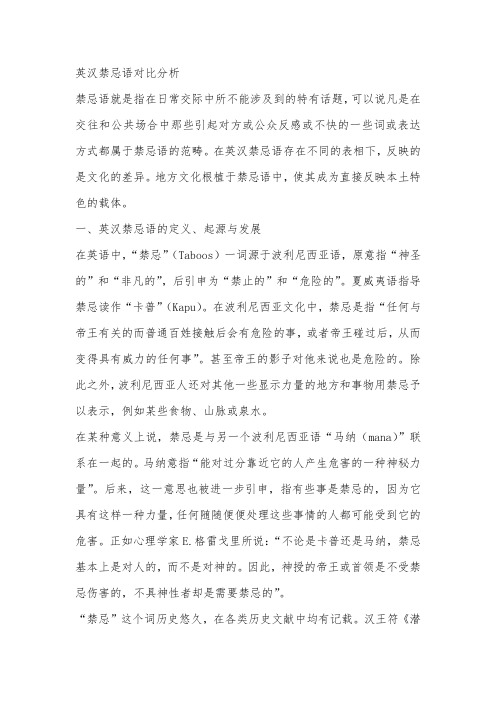
英汉禁忌语对比分析禁忌语就是指在日常交际中所不能涉及到的特有话题,可以说凡是在交往和公共场合中那些引起对方或公众反感或不快的一些词或表达方式都属于禁忌语的范畴。
在英汉禁忌语存在不同的表相下,反映的是文化的差异。
地方文化根植于禁忌语中,使其成为直接反映本土特色的载体。
一、英汉禁忌语的定义、起源与发展在英语中,“禁忌”(Taboos)一词源于波利尼西亚语,原意指“神圣的”和“非凡的”,后引申为“禁止的”和“危险的”。
夏威夷语指导禁忌读作“卡普”(Kapu)。
在波利尼西亚文化中,禁忌是指“任何与帝王有关的而普通百姓接触后会有危险的事,或者帝王碰过后,从而变得具有威力的任何事”。
甚至帝王的影子对他来说也是危险的。
除此之外,波利尼西亚人还对其他一些显示力量的地方和事物用禁忌予以表示,例如某些食物、山脉或泉水。
在某种意义上说,禁忌是与另一个波利尼西亚语“马纳(mana)”联系在一起的。
马纳意指“能对过分靠近它的人产生危害的一种神秘力量”。
后来,这一意思也被进一步引申,指有些事是禁忌的,因为它具有这样一种力量,任何随随便便处理这些事情的人都可能受到它的危害。
正如心理学家E.格雷戈里所说:“不论是卡普还是马纳,禁忌基本上是对人的,而不是对神的。
因此,神授的帝王或首领是不受禁忌伤害的,不具神性者却是需要禁忌的”。
“禁忌”这个词历史悠久,在各类历史文献中均有记载。
汉王符《潜夫论•忠贵》:“贵戚惧家之不吉而聚诸令名,惧门之不坚而为铁枢,卒其所以败者,非苦禁忌少而门枢朽也,常苦崇财货而行骄僭,虐百姓而失民心尔。
”汉应劭《风俗通•正失•彭城相袁元服》:“今俗间多有禁忌,生三子者、五月生者,以为妨害父母,服中子犯礼伤孝,莫肯收举。
”《后汉书•郎传》:“臣生长草野,不晓禁忌,披露肝胆,书不择言。
”唐苏拯《明禁忌》诗:“阴阳家有书,卜筑多禁忌。
”在西方历史上,黑人是最受歧视的种族,因此很多带有浓厚歧视色彩的词汇出现了。
随着社会的发展,人权与民族平等思想的深入人心,这些种族歧视语成了英语禁忌语的重要组成部分。
浅论中西方禁忌语对比
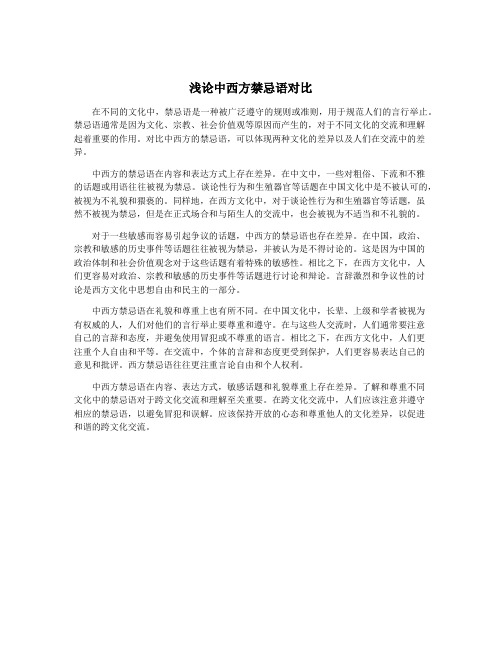
浅论中西方禁忌语对比在不同的文化中,禁忌语是一种被广泛遵守的规则或准则,用于规范人们的言行举止。
禁忌语通常是因为文化、宗教、社会价值观等原因而产生的,对于不同文化的交流和理解起着重要的作用。
对比中西方的禁忌语,可以体现两种文化的差异以及人们在交流中的差异。
中西方的禁忌语在内容和表达方式上存在差异。
在中文中,一些对粗俗、下流和不雅的话题或用语往往被视为禁忌。
谈论性行为和生殖器官等话题在中国文化中是不被认可的,被视为不礼貌和猥亵的。
同样地,在西方文化中,对于谈论性行为和生殖器官等话题,虽然不被视为禁忌,但是在正式场合和与陌生人的交流中,也会被视为不适当和不礼貌的。
对于一些敏感而容易引起争议的话题,中西方的禁忌语也存在差异。
在中国,政治、宗教和敏感的历史事件等话题往往被视为禁忌,并被认为是不得讨论的。
这是因为中国的政治体制和社会价值观念对于这些话题有着特殊的敏感性。
相比之下,在西方文化中,人们更容易对政治、宗教和敏感的历史事件等话题进行讨论和辩论。
言辞激烈和争议性的讨论是西方文化中思想自由和民主的一部分。
中西方禁忌语在礼貌和尊重上也有所不同。
在中国文化中,长辈、上级和学者被视为有权威的人,人们对他们的言行举止要尊重和遵守。
在与这些人交流时,人们通常要注意自己的言辞和态度,并避免使用冒犯或不尊重的语言。
相比之下,在西方文化中,人们更注重个人自由和平等。
在交流中,个体的言辞和态度更受到保护,人们更容易表达自己的意见和批评。
西方禁忌语往往更注重言论自由和个人权利。
中西方禁忌语在内容、表达方式,敏感话题和礼貌尊重上存在差异。
了解和尊重不同文化中的禁忌语对于跨文化交流和理解至关重要。
在跨文化交流中,人们应该注意并遵守相应的禁忌语,以避免冒犯和误解。
应该保持开放的心态和尊重他人的文化差异,以促进和谐的跨文化交流。
- 1、下载文档前请自行甄别文档内容的完整性,平台不提供额外的编辑、内容补充、找答案等附加服务。
- 2、"仅部分预览"的文档,不可在线预览部分如存在完整性等问题,可反馈申请退款(可完整预览的文档不适用该条件!)。
- 3、如文档侵犯您的权益,请联系客服反馈,我们会尽快为您处理(人工客服工作时间:9:00-18:30)。
The Comparison of Taboo Words betweenEnglish and ChineseAbstract: Taboo words is a popular language phenomenon in human language. For a long time, it has been an important part of study for many scholars from different aspects.. In the communication across cultures, we can not avoid meeting taboos. To Chinese people, it is very important to study and learn to use taboo correctly and properly, This paper gives a brief introduction of the origin of taboos. And then analyzes its similarities and differences topics between English and Chinese. Then, this paper also give some ways to figure out some problems which we replace it with euphemisms. And last we analyzes its evolution process By studying this language phenomenon, we cannot only improve our ability of comprehension, but also learn colorful culture and worldly wisdom of different society and communicate with foreigners freely and comfortably.Key words: taboo words, comparison, culture difference,similaritiesIntroductionLinguistic taboo is the common social phenomenon in different nationalities. Culture is the reflection of language which is the carrier of culture. Though language is arbitary, but it has its own inexlicable magic power as language is the tool of communication about thoughts and emotions. With the development of Two-way communication by ferquently using Chinese and English, taboo worids is becoming one of the most important parts among international communications. Therefore, the discussion of the relation between the taboo and language is conducive to English teaching and communication. What’s more, it can also help us to have a better understanding of attitudes and thinking models between China and Britain.1.The origin and background of tabooThe word “Taboo” can be traced back to the language of Tonga , Polynesian. It means “the things extremely should be paid attention”. “Taboo” also means holy, untouchable and was forbiddon used at that time. It has two aspects about this phenomenon. One is that the respected sacred items can not be literally used and the other one is people cann’t touch the nidering things casually. The production of taboo word has its own age reasons. When it was ancient ages, people had blind faith in ghosts and gods and worship God. Those things linked with ghosts and gods would not be talked casually as it might bring unfortunate to them. So it is the original reason about the taboo word. At the same time, except the region element, with the development of our society and the globalization of the whole world on custom, culture tradition, self-cultivation and communication also have a great impact on the appearance of taboo word. In different cultures, the contents and forms of taboo are different. Generally speaking, here are six types of it: mention of gods, near- swearing, sex, death, disease and excretion. However, this kind classification is not absolutely literally because the taboo is the reflection of different countries, races and cultures. What we should do is to know about them then have a good communication with others.2. The similarities between English and Chinese tabooWe all know that, we can distinguish the differences from different customs and history from both two languages, but no matter how unlike they are, there must have some similarities as we need learn and study and carry it out, especially in international communications. Both of us have taken the analogous methods to avoid those taboo[1]. And the best way to solve it is to have a suitable use of euphemism. Followed are the main aspects belong to taboos in Britain and China: 2.1 Taboos on disease and deathDisease and death is the regular pattern and it is the common topic and can not be avoided to people. There are many reasons why they are unwilling to mention it, maybe they are afraid of it and think it will bring unlucky to them. But the most important one would be the burden of their psychology. In English, people use many other euphemisms to express disease or death. Such as “be safe in the arms of Jesus”, “be asleep in the valley”,“be in Abraham’s bosom”, “be promoted to glory”,“be taken to paradise”,“breathe one's last”etc. In China, people also evade the word “death”, they may often say “mount and ride away to Elysian” or “Pass away peacefully.” From the ancie nt ages to now, there are various ways to call the different classic people’s death. For example, in English people say “He fell in battle”instead of “He was killed”. While we Chinese will say “He devoted himself to the country”. At the same time, when we talked about someonewas ill or got serious diseases, we also have tactful address. For instance, we will say “Are you feeling OK? ” to replace“Are you ill? ”. And we will use “C.C” to take the place of canner. Venereal disease substitute for “V.D”.2.2 Taboos on religion and addressThe earliest taboo of Britain is related to religion and the words about gods are regarded as holy. So people could not be blasphemous to them. They started to use euphemism to convey their respect to the gods. [2]Such as: men call the God and Satan as“the god of the world”, “the Big D”, “the good man”, “Dadi(大帝)” , “Dashen(大神)” instead of words with evil meaning. And at the same time, to China especially in the feudalism society, the common people should avert using the same words as the rulers names because the ruler should stay his unique position and nobody can shake his power. As we know, in Qin ages, the emperor named Ying Zheng. In order to not offend his imperial power, people changed “正月”into“端月”or read the word “正”in the first tone as “征”. It was very common in our ancient ages, liked the “Wen Zi Yu” in Qin dynasty as it was a big event on writings.2.3 Taboos on sexThis topic still be a secret and private one to human beings from the ancient times to now. Most of the people think it is impolite to mention anything about sex in some the social or formal interactions. Those words related with sex or genitals can be only used on a very informal occasion or in the field of medical. One of the most important reason is that both of the countries’s people, they will be very care of the education to their children. Due to the Sex Liberation in the western countries during the 1960s, the English speaking countries took a more freedom, open attitude towards sex. therefore, the phrases “to make love”, “to have sex with” “art of pleasure”, “to approach” could be often found in written form, however, when they talk about something on it, people tend to replace them with the euphemisms[2]. And when we talked about somebody has baby, people would lke to say “in the family way” or “in a delicate condition” rather than use the wold “pregnant”. And to Chinese, in general, we may say “she will be a mother soon” or “she has something happy”.2.4 Taboos on sexual discriminationIn both English and Chinese, there are lots of languages whose centre is depended on man. They are partial to and side with man while belittle woman. The most obvious example is that people will not use “she”to instead of “he” in communication as well as t o Chinese when the sexual distinction is not clear. The host will call woman “chairman” even “madam chairman”. In ancient China, women are thought as ignorance, lower status, “woman’s view(妇人之见)”,“long hair with short experience(头发长见识短)” and so on. While the husband may call his wife as “in home(家里的)”,“the behind(后头的)”or “humble wife(贱内)”. As for Chinese characters, there are lot of words with evil meaning formed by “女”,such as “奸”,“嫖”,and “婊”. So it is unfair for people to look down on woman.In conclusion, the taboo in English and Chinese have some similar characters and tendency. Though there may be lots of differences on geography , languages, customs and other aspects, the thought of one thing can't be totally contrary, it is the general character of human.3. The differences between English and Chinese tabooEnglish and Chinese are belong to two different language families, included the discrepancieson history, culture, thought, cognition, psychology and other terms, which have made the inevitable differences between English and Chinese taboo. We can see it fall into the following four aspects.3.1 Taboos on age and body weightIn English communication, the question “How old are you?” and “What is your age?”are seldom used by people as it is very impolite and embarrassed to ask such questions. They would like to say “senior citizen” than “old people” and when say someone is fat, we can describe he/she as full figure. “Becoming old” is an inexorable natural law, however, people in China and Britain hold different opinion towards it, and produce different cultural connotations. Generally speaking, Chinese give “the old age” a more positive meaning, for “old” is the symbol of wisdom and experience. Chinese people always take the old age to proud when they are addressed as “old Wang”, “old Yang”, or “old Zhou”. As the saying goes“老骥伏枥,志在千里”and “姜还是老的辣”. And to weight, most Chinese people are found of “a little bit heavier(发福)”,as it indicates that he/she has a good life condition. Particularly in Tang dynasty people see fat as beauty.3.2 Taboos on income and matrimonyThese two aspects are both private things. People take serious attitude toward it in English speaking countries. While in China, the daily conversation like “Are you married?”, “What is you income?”, “How much is you cloth?” or “Why do you divorce with your husband?”is easily accepted by Chinese as people think it is a good reflection about their works and lives and they are all pleasant to share them with others. To English, it will be regarded as one kind invasion of privacy and people will be unhappy if you ask such questions. Unlike Chinese, English people will often greet other people with the question “How nice the weather!” , “Morning!” or “How are you!”. Because Chinese think i t is a good way to further affection between friends or neighbours by talking about the most care thing and also can show solicitude for others. To youth, nowadays, most people will judge if he/she is a close friend depend on whether he/she talk everything with him/her. It maybe a little absolute but it is the common phenomenon in China.3.3 Taboos on politicsWith the rapidly development of frequent international associations, under the globalization, there have been turned up some political euphemism, s uch as “developing countries”and “south-north dialogue(south represents developing countries and north represents developed countries )”. It is very important for those countries to pay attention to the political taboos because it can have a great impact o n the whole world’s common development and harmony, like economy, military affairs, culture, etc. so that they can achieve the rewarding benefits. In the international communication, the peace of the world is very important. A suitable address of conference or activities should avoid discriminating undeveloped countries so that can make the communication smoothly.ConclusionIn a word, every country or nationality has its own taboos as we are living in different environment, which determine we could not have the same things on common. What we should do is to know about the differences and similarities of taboo words between English and Chinese thenwe can have a full use of them to create a more harmonious atmosphere for international communication and cooperation. After that, when we come cross some taboos about the place, we can have a quick response to adopt euphemism or other ways to replace it. That is the target why we do such studies. No matter we talk about the differences or similarities, based on nowadays achievements, we can clearly see that some aspects of the taboos are becoming the same though they are almost different now. At the same time, the mix together of different cultures also remind us to keep the characters of native culture and improve it by learning others, which will be a appropriate method to enhance the international communication.References[1].Zhen ya. Language and Culture [M]. Beijing: Higher Education Press, 2004[2]Chang Yujie. On Cultural Difference of the Taboo Words between English and Chinese,2011[3]胡文仲.中西文化习俗比较.北京: 外语教学与研究出版社, 2001.[4]李桂媛. 英汉禁忌语及委婉语探讨[ J ]. 天津外国语学院学报, 2004, (5)[5]叶玲. 浅谈带有社会和心理印记的英汉禁忌语[J]. 科技资讯,2007(14).。
